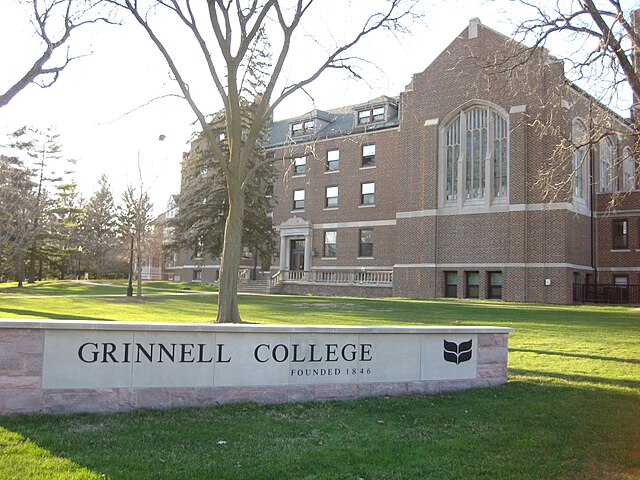
Department chair reserves judgment, cites ‘openness to dialogue’
Student activists are calling on a small liberal arts school in Iowa to end academic freedom in the name of racial justice.
The response from the administration and department chairs? Crickets.
Grinnell College did not respond to College Fix queries about whether it will commit to retain its policy on “academic freedom and integrity” and not replace it with a “Racial Slur Clause,” as proposed in a campus newspaper op-ed.
The only department chair who agreed to an interview also declined to criticize the student activists’ demand to end academic freedom, calling for “openness to dialogue.”
While the Aug. 4 op-ed in The Scarlet & Black says it’s responding to an unnamed white professor’s “use of the n-word,” Religious Studies Chair Tyler Roberts told The Fix he doesn’t know of the incident to which they refer. The newspaper does not appear to have reported on any such incident.
The Foundation for Individual Rights in Education, which gives Grinnell its worst rating for free speech policies, issued a preemptive warning in the event administrators are seriously considering the activists’ demands.
“Replacing an academic freedom policy with the policy proposed here would be a marked departure for an institution dedicated to the free and open exchange of ideas,” Adam Steinbaugh, director of its Individual Rights Defense Program, told The Fix, referring to the policy’s language.
MORE: Grinnell settles anti-male bias suit rather than face jury
Micromanage classrooms, put professors under surveillance
The op-ed by Raven McClendon and Errol Blackstone does not give the context of the white professor’s alleged use of the n-word, other than to say it was “inappropriate regardless of context.” The incident has “prompted outrage among students.”
They issued a list of 14 demands that “center the well-being of Black students, healing, and harm reduction,” requiring changes to college policy and handbooks for students, faculty, and staff.
Blackstone, whose Facebook page says he graduated this spring, created online forms to collect testimony and support regarding “racial slurs in the classroom,” implying the unnamed professor quoted the n-word from a course reading.
“Students have asked for a response from the college and have been met with claims of ‘academic freedom’ and ‘freedom of speech,’” both forms read. “The allowance of anyone (student or professor) using racial slurs inside Grinnell’s classroom without consequence speaks to a larger issue of white supremacy embedded in its institution.”
The testimony form assures students they can submit anonymous accusations. “The plan is to organize these testimonies to build an argument for major structural changes including but not limited to: firing of unqualified tenure[d] professors, re-writing of faculty dismissal clause, more student input in administrative processes, push for anti-racist action from college … [sic].”
MORE: Black Harvard prof says n-word 16 times to defend white Stanford colleague

The op-ed asks students to submit testimony “if you have had a harmful encounter with a racist professor” and to offer their support if “you agree that white professors should not say, write, or sign racial slurs.”
In fact, their only example of racist behavior is white people using the n-word. “A white man’s ‘right’ to academic freedom should never be more important than the outcry of harmed students,” McClendon and Blackstone wrote, implying that the academic freedom policy violates the college’s non-discrimination policy.
The academic freedom policy begins by citing frequent “conflicting interests” with Grinnell’s non-discrimination policies, especially when “applied to questions of freedom of speech and freedom of association.”
The college puts “liberal education” ahead of other considerations, and such education “cannot take place without the free, open, and civil exchange of ideas.” While these conditions depend on “an atmosphere free of discrimination and harassment,” Grinnell will not second-guess academic freedom unless it is “used to disguise, or is the vehicle for[,] Prohibited Behavior.”
 McClendon and Blackstone (left) wrote that they are “tired of battling racism while merely trying to learn,” and disappointed in Grinnell’s practice of “bringing Black students here for diversity without ensuring that the campus and its policies are actually inclusive.”
McClendon and Blackstone (left) wrote that they are “tired of battling racism while merely trying to learn,” and disappointed in Grinnell’s practice of “bringing Black students here for diversity without ensuring that the campus and its policies are actually inclusive.”
They demand the replacement of the academic freedom policy with a “Racial Slur Clause” as well as “[v]iable and meaningful consequences for faculty who perpetrate racism.” Neither demand offers further specifics.
MORE: University bans white professor from honors program for quoting black author
The college must fund an “anti-racist task force comprised solely of students” and include student senators in rewriting the student handbook.
Many of the demands would micromanage classroom practices. The college must give the Student Educational Policy Committee the right to “observe and evaluate professors/classes either randomly or at a scheduled time.” McClendon and Blackstone also want “the length of professor contracts” to be public.
“All classes [must] begin with an acknowledgement of Indigenous land, and the first five minutes of every class, throughout the school year, should be dedicated to Black Lives Matter,” one demand reads.
Students must not be sanctioned for failure to attend class, and grading must be done “in groups of two or three to alleviate explicit or implicit bias.” The college must collect “demographic data” on which students receive “Academic Progress Reports,” to be reviewed by the chief diversity officer. (Such reports are submitted by faculty when students have “academic difficulty.” The demand implies some racial groups receive them disproportionately.)
The Fix called and emailed Grinnell media relations Aug. 5-8 to ask for its response to the demands, including whether the college will protect the academic freedom policy as currently worded. The Fix also asked what consequences currently face faculty “who perpetrate racism,” as worded in the demand; how Grinnell defines “racism”; and how the definition affects faculty rights. It did not respond.
They’re just addressing the ‘systemic racism that is rife in our society and institutions’
Roberts, the religious studies chair, did not fault the student activists for demanding curbs on academic freedom.
“What is needed right now is that the administration and faculty at institutions like mine listen carefully to what students of color and others are saying about their experience and take seriously their efforts to address the systemic racism that is rife in our society and institutions,” he wrote in an email:
This requires openness to dialogue and a refusal to rush to judgment. I look forward to engaging in discussions with these students and others and will come to any judgments on the particular issues you mention only in the context of those discussions.
MORE: White prof under ‘discrimination’ investigation for quoting black author
 Roberts (right) added that he was “not aware of any general discussions addressing the demands or any official Grinnell College response.” No other department chair responded to Fix queries.
Roberts (right) added that he was “not aware of any general discussions addressing the demands or any official Grinnell College response.” No other department chair responded to Fix queries.
While the college “legally must” address racial harassment and discrimination, “a commitment to freedom of expression means abstaining from punishing students or faculty who discuss offensive materials or subjects when they are pedagogically-relevant,” FIRE’s Steinbaugh wrote in an email.
“Academic freedom protects the right of faculty members to choose whether and how to confront and examine hateful or offensive history, art, music, and other subjects,” he continued. “It also protects the right of students or other faculty members to criticize those choices.”
Convinced white student leader to resign for same decision she joined
This new campaign is not McClendon’s first attempt to get a white member of the community in trouble for something that offended her.
In a seven-part June Instagram post, she criticized Amelia Zoernig, the student government’s vice president of student affairs, for approving a “jungle-themed” party as the chair of all-campus events. The party plan was submitted by the women’s tennis team, and included a dozen “inflatable monkeys.”
McClendon herself approved the plan as a senator and member of the all-campus events committee with Zoernig, but she wrote that she was “quite uncomfortable” with the proposal. She voted for it because “I didn’t want to be the voice of all Black Grinnellians” by opposing it. (The other committee member appears to be Indian.)
When McClendon got “the courage” to tell Zoernig the theme offended her, the chair said she would change the theme to a “Rainforest Rave” and ditch the monkeys. That didn’t satisfy McClendon, because the party was “racist” from the start.
She called on Zoernig to resign, labeling the white woman “a perpetrator of my racialized trauma.” The chair obliged, writing in a July 3 resignation letter that she was guilty of “whitewashing” the event and should have shamed the tennis team for suggesting it, according to The Scarlet & Black.
The resignation emboldened McClendon in her quest to “scrap” and rebuild the Student Government Association, which she considers “anti-Black” because it uses Robert’s Rules of Order, the newspaper reported.
Before convincing Zoernig to resign, McClendon (below) was known at Grinnell for writing a column for the newspaper’s “Day in the Life” feature.

MORE: New School exonerates white professor for quoting James Baldwin
MORE: Prof beats racism investigation for using n-word in class, still in trouble
IMAGES: MILKXT2/Shutterstock, public domain, Errol Blackstone/Facebook, Grinnell College, Raven McClendon/Facebook
Like The College Fix on Facebook / Follow us on Twitter







Please join the conversation about our stories on Facebook, Twitter, Instagram, Reddit, MeWe, Rumble, Gab, Minds and Gettr.